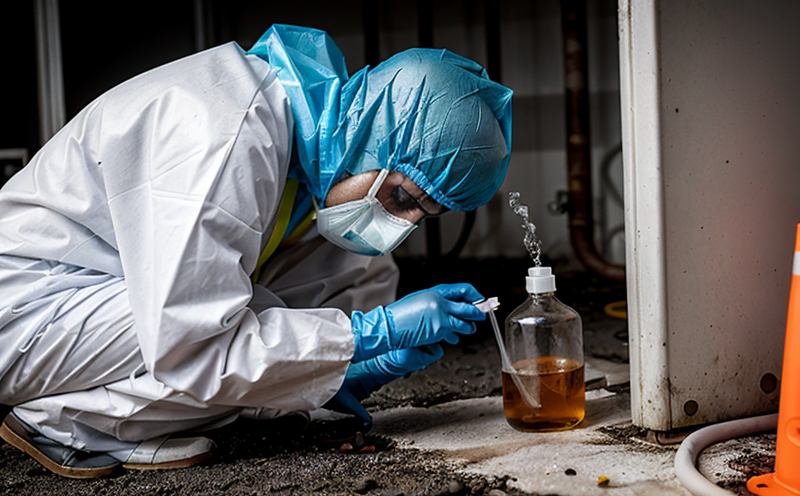ASTM D808 Nitrate Contamination Testing in Powders
The ASTM D808 nitrate contamination testing is a critical procedure used to evaluate the presence of nitrates in powder materials, which are widely utilized across various sectors including aerospace, automotive, and electronics. Nitrates can be detrimental to the performance and quality of these powders if not properly managed during manufacturing processes or storage conditions.
The standard test method ASTM D808 provides a robust framework for detecting nitrate contamination in powdered materials through chemical analysis techniques. It involves dissolving the sample powder into an appropriate solvent before performing qualitative or quantitative analysis depending on specific requirements defined by clients or regulatory bodies like ISO, ASTM, and EN standards.
The process begins with accurate sampling of the powder followed by thorough preparation steps ensuring all particles are uniformly distributed within the solution without affecting results. Once prepared, several analytical methods such as UV-Vis spectroscopy, ICP-AES (Inductively Coupled Plasma Atomic Emission Spectroscopy), or HPLC (High Performance Liquid Chromatography) can be employed to measure nitrate concentrations accurately.
Quality managers and compliance officers play a crucial role in ensuring that production processes adhere strictly to these standards. By implementing ASTM D808 testing early on, they can identify any potential issues related to nitrate contamination before proceeding further into manufacturing stages which could lead to costly rework or scrap losses at later stages.
R&D engineers also benefit significantly from this service as it helps them understand how different raw materials behave under various conditions when exposed to nitrates. This information is invaluable for developing new formulations that are more resistant to nitrate contamination, thereby enhancing product longevity and reliability.
For procurement teams within organizations dealing with additive manufacturing or 3D printing technologies, knowing the level of nitrate contamination in incoming raw materials ensures only high-quality components make it into their supply chain. This reduces risks associated with substandard products reaching end-users, ultimately boosting customer satisfaction levels.
Frequently Asked Questions
Benefits
Implementing ASTM D808 nitrate contamination testing offers numerous advantages to businesses operating within the additive manufacturing sector:
- Improved Product Quality: By eliminating unwanted nitrates from raw materials, companies can enhance the overall quality of their final products.
- Enhanced Compliance: Ensuring adherence to international standards such as ASTM D808 helps organizations meet regulatory requirements and gain market access more easily.
- Cost Efficiency: Early detection of nitrate contamination prevents costly reprocessing or scrapping of batches that do not meet specifications.
In addition, consistent application of this testing ensures long-term reliability and safety for end-users, contributing positively to brand reputation and customer trust.
Why Choose This Test
- Precision: Using ASTM D808 ensures precise measurement of nitrate levels in powdered materials ensuring accurate results every time.
- Repeatability: The test method allows for consistent results across multiple samples, making it reliable and repeatable.
- Regulatory Compliance: Adherence to ASTM D808 helps ensure compliance with industry-specific regulations governing nitrate content in materials.
By choosing ASTM D808 testing services, businesses can gain confidence knowing their powdered materials are free from harmful nitrates, thus protecting both the environment and human health while maintaining product quality standards.
Competitive Advantage and Market Impact
Adopting ASTM D808 nitrate contamination testing provides significant competitive advantages in terms of operational efficiency and customer satisfaction. Here’s how:
- Differentiation: Offering reliable, nitrate-free powdered materials sets companies apart from competitors who may not prioritize such quality controls.
- Customer Trust: Providing high-quality products builds trust with customers, fostering loyalty and repeat business opportunities.
- Market Expansion: Meeting stringent quality standards opens up new markets where compliance is essential, expanding geographical reach.
In addition to these benefits, businesses that excel in nitrate contamination testing can anticipate reduced waste generation due to fewer rejections and scrap rates. This not only lowers operational costs but also contributes positively towards sustainability goals.





